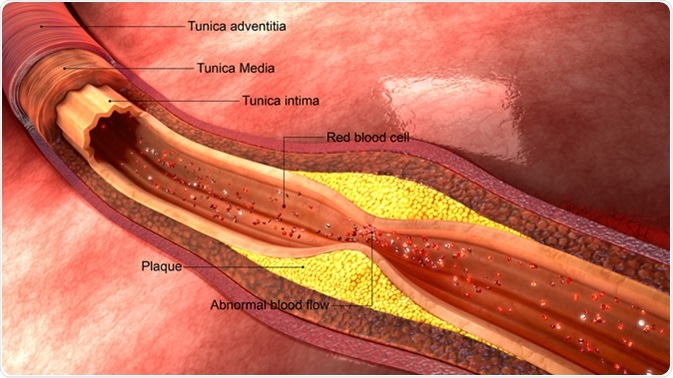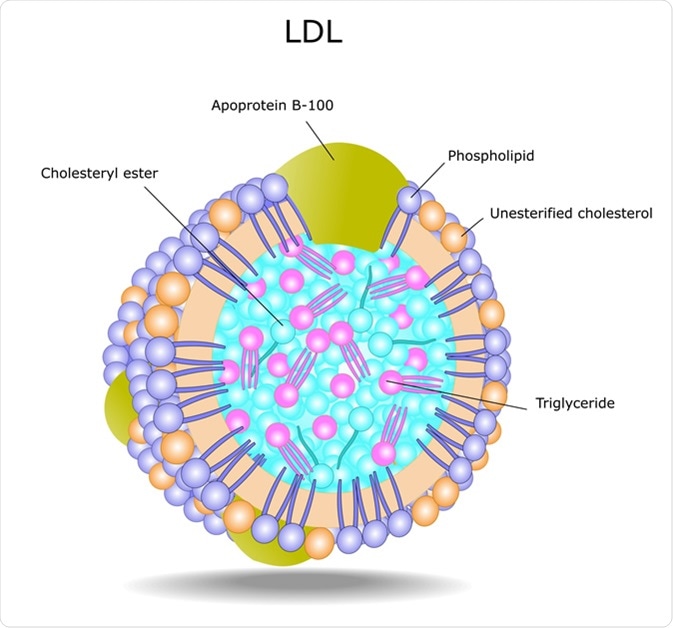Skip to:
Cholesterol is transported around the body in the bloodstream on proteins called lipoproteins. There are two types of lipoprotein: low-density lipoprotein (LDL), which is sometimes called "bad" cholesterol and high-density lipoprotein (HDL), also referred to as "good cholesterol."
A high LDL level is associated with an increased risk for heart disease and stroke. LDL transports cholesterol to the arteries, and when the LDL level is elevated, this cholesterol can accumulate in the blood vessel walls and contribute to the formation of a plaque.
This plaque formation, or atherosclerosis, can eventually cause the vessel to narrow and decrease blood flow to the heart (coronary artery disease). If the vessel becomes blocked so that blood no longer reaches the heart or brain, this can result in chest pain (angina), heart attack, or stroke.

Atherosclerosis 3d illustration. Credit: Sciencepics / Shutterstock
HDL carries cholesterol to the liver, where it is removed from circulation and eliminated from the body. In this way, HDL can prevent plaque formation, protect the arteries, and reduce the risk for cardiovascular disease. It is generally considered that the higher the level of this good cholesterol, the lower the risk is for heart disease, vascular disease, and stroke.

Structure of lipoprotein, the low-density lipoprotein (LDL). Image Credit: Ellepigrafica / Shutterstock
One-third of the US population has elevated LDL
More than one-third of the US population has an elevated LDL level. People with high LDL are advised to make lifestyle changes and to use cholesterol-lowering medications if lifestyle changes alone are insufficient. Lower LDL levels are better, to a point, but a recommended goal is a blood level of less than 130 mg/dL among people who do not have atherosclerosis or diabetes. For those conditions, the recommended target may be lower.
The main approaches to lowering LDL cholesterol are dietary and lifestyle changes. Initial steps may include following a low-fat diet, engaging in aerobic activity, losing weight, and reducing waist circumference. In cases where these changes are not enough to lower LDL, a cholesterol-lowering medication such as a statin may be prescribed.
Hypercholesterolemia
In rare cases, people have a very high LDL level as the result of an inheritable genetic disease called hypercholesterolemia that reduces the liver's ability to clear excess cholesterol. The very high LDL level can lead to heart attack and stroke among younger individuals, meaning medication may be required to prevent or treat atherosclerotic heart disease at an earlier age.
One group of researchers tried to dispute the link between elevated LDL and heart disease
Recently, one group of researchers has challenged the connection between raised LDL and heart disease.
A 2018 article published in the journal Expert Review of Clinical Pharmacology challenged the long-held belief that "bad" LDL cholesterol causes heart disease.
Lead author Uffe Ravnskov and colleagues claimed that the cholesterol hypothesis is based on "misleading statistics, exclusion of unsuccessful trials, and by ignoring numerous contradictory observations."
The authors also stated that statin treatment, particularly when used as primary prevention, is of doubtful benefit.
Another study by the same group published in BMJ Open in 2016 reviewed previous research studies covering almost 70,000 people and reported no association between elevated LDL and premature death from cardiovascular disease among people older than 60. In fact, study author Malcolm Kendrick reported that 92% of the individuals who had high cholesterol lived longer and had less heart disease.
"Since elderly people with high LDL-C live as long or longer than those with low LDL-C, our analysis provides reason to question the validity of the cholesterol hypothesis," wrote Ravnskov, a former associate professor of renal medicine at Lund University in Sweden.
The authors also believed that their study called for a re-evaluation of the guidelines for cardiovascular prevention, "in particular because the benefits from statin treatment have been exaggerated."
Co-author Sherif Sultan from the University of Ireland described cholesterol as one of the "most vital" molecules in the body and said it prevents infection, cancer, muscle pain, and other conditions among the elderly:
"Lowering cholesterol with medications for primary cardiovascular prevention in those aged over 60 is a total waste of time and resources, whereas altering your lifestyle is the single most important way to achieve a good quality of life."
Ravnskov also said there was "no reason" to lower elevated LDL.
Research slammed by critics
However, epidemiologist Colin Baigent from Oxford University said the analysis had "serious weaknesses and, as a consequence, has reached completely the wrong conclusion."
Consultant cardiologist Tim Chico from the University of Sheffield, was also skeptical, saying that a randomized study where some patients received a cholesterol-lowering drug while others received a placebo would be more convincing. He said such studies have been conducted before and have shown that lowering cholesterol with medication does reduce the risk of heart disease in the elderly: "I find this more compelling than the data in the current study."
The British Heart Foundation (BHF) also questioned the research and stressed that the link between high LDL and death among the elderly is more challenging to detect because, as people age, more factors influence overall health.
A BHF spokesperson concluded: "There is nothing in the current paper to support the authors' suggestions that the studies they reviewed cast doubt on the idea that LDL cholesterol is a major cause of heart disease or that guidelines on LDL reduction in the elderly need re-evaluating."
Further Reading
Last Updated: Feb 18, 2020